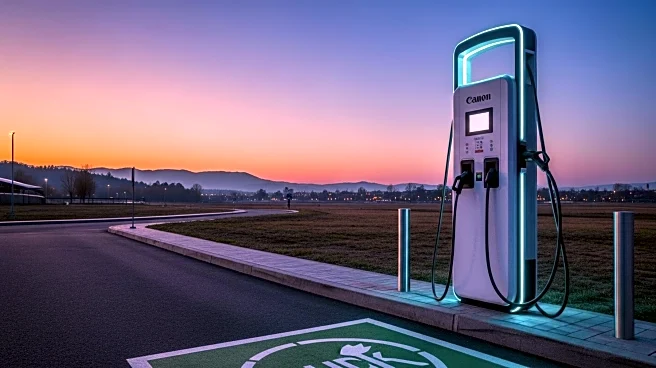What's Happening?
A recent analysis highlights the cost differences between charging electric vehicles (EVs) and fueling gasoline-powered cars in the United States. The study reveals that charging an EV is generally cheaper than refueling a gas-powered vehicle. On average, the monthly cost of charging an EV is approximately $73, compared to $159 for gasoline. This comparison is based on driving 1,250 miles per month. The cost of electricity varies across the U.S., with higher rates in states like Hawaii and California, while being lower in the Midwest. Public charging stations, often more expensive than home charging, add complexity to the cost equation. Tesla's charging network, for example, includes additional fees to encourage efficient use of charging stations.
Why It's Important?
The findings underscore the economic benefits of EVs, particularly as gasoline prices remain volatile. For consumers, the potential savings on fuel costs could be a significant factor in the decision to switch to electric vehicles. This shift could also impact the automotive industry, encouraging manufacturers to increase EV production and infrastructure development. Additionally, the reduced reliance on gasoline aligns with environmental goals, potentially decreasing carbon emissions. However, the initial costs of home charging installations and the variability of electricity prices remain challenges for widespread EV adoption.
What's Next?
As the EV market grows, further developments in charging infrastructure and technology are expected. This includes potential reductions in installation costs for home chargers and increased availability of public charging stations. Policymakers may also introduce incentives to encourage EV adoption, such as tax credits or rebates for home charging equipment. The automotive industry is likely to continue innovating to improve battery efficiency and reduce costs, making EVs more accessible to a broader audience.
Beyond the Headlines
The transition to electric vehicles also raises questions about energy consumption and grid capacity. As more consumers switch to EVs, the demand for electricity could increase, necessitating upgrades to the power grid. Additionally, the environmental impact of battery production and disposal remains a concern. Addressing these issues will be crucial for ensuring that the shift to electric vehicles is both economically and environmentally sustainable.











